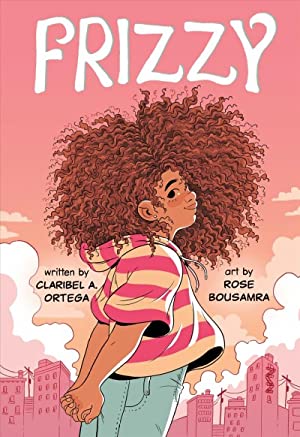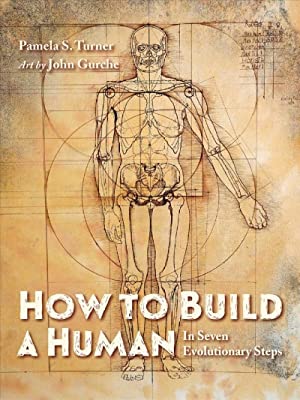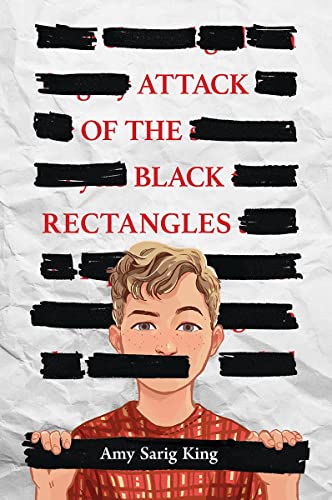The American Library Association will announce the winners of its very influential Youth Media Awards, headed by the Newbery and Caldecott. Since we can’t help projecting, here are three more titles that appeared in Mock Newbery and “best of” lists last year.
Frizzy by Claribel A. Ortega, art by Rose Bousamra. First Second, 2023, 213 pages.

Marlene’s least favorite day of the week is Sunday, where she spends hours at the salon getting her hair straightened. The Saturday before her cousin Diana’s quinceañera is especially grueling, because Marlene will suffer by comparison with Diana’s “good hair,” whatever she does. “Bad hair” is the legacy of her late father, but it’s an open secret that her mother’s hair is equally cursed. Or that’s how Mami sees it. Those Sunday mornings at the salon are more for Mami’s benefit than Marlene’s.
Clearly, hair is a stand-in for persona, and Marlene longs to just be herself. That leads to some disastrous experiments before coming to the point of outright rebellion. Fortunately she has a supportive best friend for moral support and a supportive aunt for hair tips and products. “Hair” has been the subject of several award-winning picture books over the last few years, and with this graphic novel it goes into hyperdrive. Eventually, Mami comes around and Marlene can look to the future as her more authentic self.
Overall Rating: 3.75
What are its chances? Slim, for Newbery recognition, but a good shot at one of the Pura Bel Pre awards.
How to Build a Human in Seven Evolutionary Steps by Pamela S. Turner, art by John Gurche. Charlesbridge, 140 pages, plus notes, timelines, and bibliography.

As the title suggests, this is the unfolding story off how early primates learned to walk upright, use tools, speak intelligible languages, and eventually (over millions of years) become us. Chapter titles let us know the text will be clever and catchy: 1) We Stand Up; 2) We Smash Rocks; 3) We Get Swelled Heads; 4) We take a Hike; 5) We Invent Barbecue; 6) We Start Talking (and Never Shut Up); 7) We Become Storytellers. “We” are the heroes (or lucky accidents, or even antiheroes) of the story, referred to throughout in first person plural. Anybody feeling human yet? If so, the conclusion is “We Dominate,” and we’d better start taking responsibility for the degradation of our planet, buster, or “We Are Toast.”
What’s missing is a detailed explanation of how all this happened, beyond the cover-all-arguments phrase, natural selection. “[T]he environment tests and the environment selects” (emphasis in the original) and that’s all we need to know. The narrative is so engaging, and the illustrations of early hominids so striking, that most readers are unlikely to question further. An intriguing series of pictures in the last chapter gives food for thought. These are photos of human handprints discovered in caves all around the world, dating from roughly the same prehistoric period. To the author, these speak of the remarkable unity of the animals we call human, who should be using their common traits to build a better world. To me, they speak of reaching up and outward to the Hands that made them.
Who’s right?
Overall Rating: 3.5 (strong on artistic/literary merit, weak on worldview)
What are its chances? Nonfiction rarely gets a Newbery medal, but it’s a likely choice for one of the nonfiction awards.
Attack of the Black Rectangles by Amy Sarig King. Scholastic, 2023, 272 pages

Mac has an interesting family. His father is a self-identified alien (as in, from another planet), his Grandad is a Vietnam veteran-turned-hippy, and his mother is a model of grace and forbearance. But “No one is ever just one thing,” including his teacher Ms. Sett. It’s easy to dismiss her as a community do-gooder who knows what’s best for everyone and is willing to force (or strongly suggest) conformity, but she’s also an enthusiastic, effective, and sympathetic teacher. At the beginning of 6th grade, Ms. Sett arranges everyone in literary circles and assigns each circle a book to read and discuss.
Mac’s group is supposed to read The Devil’s Arithmetic, by Jane Yolen. It’s about the holocaust, which is a shocking and depressing subject. But Mac and his friends Denis and Marci are further shocked (and outraged) when they reach the chapter with words blacked out. They have to go to the local bookstore to discover the missing words, which turn out to be unobjectionable terms for human anatomy. Outrage leads to protest, as the issue helps clarify Mac’s relationship to his family, his friends, and the truth.
The author, who writes popular YA fiction under the name A. S. King, used an actual incident in her home town as springboard for this story. She creates winsome characters with more than one or two dimensions, but I can’t say the same for her politics. In Mac’s quest for truth, King addresses propaganda (see the class lesson on Columbus as hero) with more propaganda (Columbus as an unalloyed villain, Thanksgiving as a tragedy). Blacking out common words for human anatomy is silly, but using that incident as a test case for all censorship is simplistic—like comparing conservatives to the Flat Earth Society, which she also does. The story leaves no question as to which side the reader should choose, but the reader hasn’t heard all the facts of the case.
Overall Rating: 3.5
What are its chances? Better than even, I’d say. The banned books controversy is hot this year, and librarians, teachers, and authors are up in arms about it. Newbery picks aren’t all about politics, but it’s hard to believe the issue won’t figure at all.
Read more about our ratings here.
We are participants in the Amazon LLC affiliate program; purchases you make through affiliate links like the one below may earn us a commission. Read more here.
Support our writers and help keep Redeemed Reader ad-free by joining the Redeemed Reader Fellowship.
Stay Up to Date!
Get the information you need to make wise choices about books for your children and teens.
Our weekly newsletter includes our latest reviews, related links from around the web, a featured book list, book trivia, and more. We never sell your information. You may unsubscribe at any time.
We'd love to hear from you!
Our comments are now limited to our members (both Silver and Golden Key). Members, you just need to log in with your normal log-in credentials!
Not a member yet? You can join the Silver Key ($2.99/month) for a free 2-week trial. Cancel at any time. Find out more about membership here.
3 Comments
Leave a Comment
You must be logged in to post a comment.


Why is there particular controversy about banned books this year? I’m afraid I haven’t been keeping a super close eye on the publishing world or anything.
During the lockdown, parents became more aware of what their kids were learning and reading in school. This coincides with a rise in more explicit books and graphic novels in school libraries specifically featuring queer/trans themes (“queer” being the current all-purpose term for nontraditional gender identities and sexual attractions. Many of these books were actually written for adults, but ended up on the ALA’s ALEX list (adult books with particular appeal to teen audiences). Parents are saying, “No more,” and running for school board to get objectionable material out of school libraries. (Public libraries, to my knowledge, are not under fire.) Some valuable books have been swept up in the purge, but in many cases the outrage is justified.
I have not yet read Frizzy as I have difficulty obtaining graphic novels. As for Attack of the Black Rectangles, I enjoyed it, although the plot frustrated me. Of course, the teacher would be portrayed as the villain, (although to be fair, I think the author tried to humanize her toward the end). I think the inclusion of Jane Yolen herself as a character will hurt the book’s chances, although I enjoy that aspect.
I think How to BUild a Human has the strongest chance, which makes me a little sad even though the writing is good and the information is cohesive and cleverly done. i just don’t agree with the topic.
Meredith Leigh BUrton, author of Song of the Sea